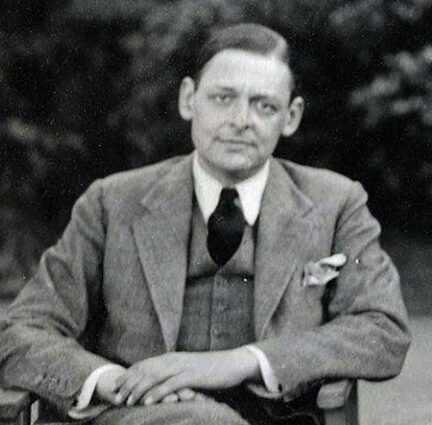Thomas Stearns Eliot (1888–1965), better known as T. S. Eliot, was one of the most influential poets, critics, and dramatists of the 20th century. Born in St. Louis, Missouri, Eliot eventually became a British citizen in 1927, a reflection of his deep intellectual and cultural ties to England. His work shaped modernist literature with its radical break from traditional forms and its profound exploration of spiritual, psychological, and cultural disillusionment.
Eliot’s poetry is marked by its dense allusiveness, fragmentation, and complex symbolism. His early masterpiece, The Love Song of J. Alfred Prufrock (1915), introduced a voice that was introspective, ironic, and painfully self-aware. The speaker, Prufrock, embodies modern alienation and the paralysis of action in a world stripped of meaning. The poem’s vivid imagery and free verse style were revolutionary at the time and helped establish Eliot as a major new voice in literature.
His most famous work, The Waste Land (1922), is often considered the definitive poem of modernist literature. Composed in the aftermath of World War I, the poem captures a sense of cultural decay and spiritual emptiness. It weaves together a tapestry of voices, languages, and literary references—from the Bible to Shakespeare to Hindu scriptures. Edited heavily by Ezra Pound, the poem presents a world fragmented and yearning for redemption, reflecting Eliot’s own spiritual quest and the broader disillusionment of the age.
Eliot’s later works reveal a movement toward spiritual and religious resolution. Ash-Wednesday (1930) and the Four Quartets (1935–1942) are deeply meditative, drawing on Christian themes and mystical philosophy. In these poems, Eliot grapples with time, suffering, and the search for divine meaning, presenting a more hopeful and mature worldview compared to his earlier works. The Four Quartets in particular is regarded as a profound meditation on the human condition and spiritual transcendence.
Beyond poetry, Eliot was a towering literary critic. His essays, including Tradition and the Individual Talent (1919), reshaped literary theory by emphasizing the importance of historical context and the impersonality of the artist. He believed that great poetry transcended the personal and tapped into a larger tradition. This idea stood in contrast to the Romantic emphasis on personal emotion and innovation.
Eliot also made significant contributions to drama, writing plays such as Murder in the Cathedral (1935) and The Cocktail Party (1949). His plays combined poetic language with religious and philosophical themes, expanding the scope of modern theater.
Eliot received numerous honors for his work, including the Nobel Prize in Literature in 1948. Though his conservative views and high cultural standards drew criticism, his influence on modern poetry, literary criticism, and drama is enduring.
T. S. Eliot was a master of literary innovation and philosophical depth. His work reflects the spiritual and cultural crises of the modern world while seeking, ultimately, a path toward order and meaning. Through his powerful use of language and his profound insight into the human soul, Eliot remains a central figure in the study of literature and modernism.
Poems
“The Love Song of J. Alfred Prufrock”
- “The Love Song of J. Alfred Prufrock”: Complete break with the romantic and conventional tradition
- “The Love Song of J. Alfred Prufrock” – Realism in Diction, Versification and Subject Matter
- “The Love Song of J. Alfred Prufrock” – Sordidness and Pettiness of Modern Urban Civilization


